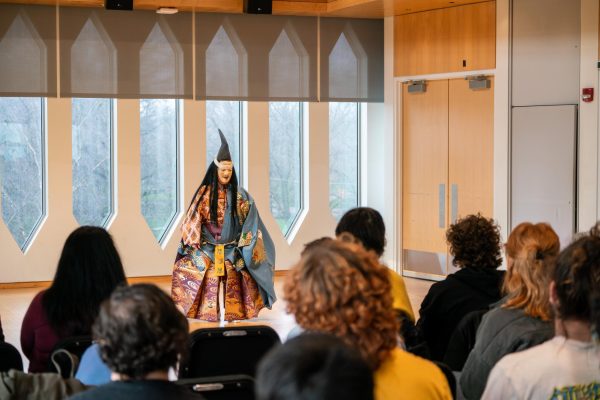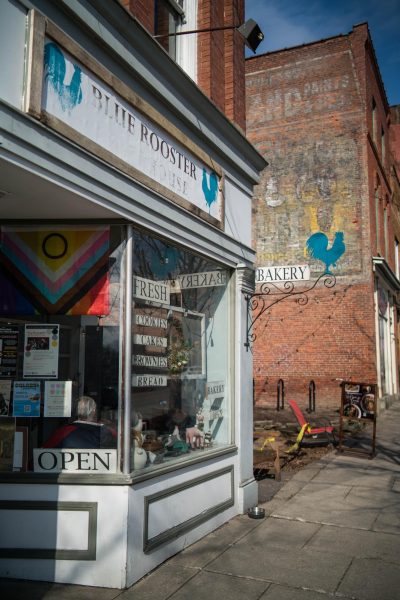Asian Food Authenticity Panel Challenges White, API Students
Asia Night Market, Oberlin’s annual December tradition where students of Asian and Pacific Islander heritage celebrate their culture and cuisine, will take place tomorrow night in the Root Room of Carnegie Building from 6-8 p.m. The event, this year in its sixth iteration, is one of the only collaborations between many of the API student organizations on campus. These organizations will prepare traditional food from their respective countries of origin in order to share the role food plays in informing their cultural identities with the campus community. In recent years, API students have tried to bridge the gap between consumption and understanding the food served at Asia Night Market by organizing panels, lectures, and participatory events leading up to the featured evening.
On Nov. 29th, the Pan-Asian Committee arranged a panel titled “What is Authentic? Investigating Asian Diasporic Food” to allow guests to learn about Asian food and culture and grant students of the API diaspora the chance to grapple with what authenticity means to them. One of the underlying themes of the panel, which featured seven participants from several API student organizations, was the nuance of defining the authenticity of food. In one sense, authenticity stems from the method of how one cooks and how understanding and respecting a dish’s origin are critical in its preparation. On the other hand, panelists also touched upon the subjectivity of authenticity, and how what an individual grows up with and where they are from also constructs how a sense of the genuine is constructed — the way something is cooked in your home can be authentic to someone, even if it isn’t authentic to their cuisine.
To some panelists, authenticity was an active practice, a journey in learning their culture and heritage as members of the diaspora. Because food is so personal and engrained in identity, cultural appropriation is a sensitive matter that the panelists wanted to address in both food and their traditional practices.
College junior Jordan DeAngelo, one of the panel organizers, said that the event was arranged to encourage people who come to Asian Night Market to overcome cultural appropriation by recognizing the meaning of food and how the API students value it.
“I think it’s very useful too for non-Asian audiences to know when it’s appropriate to try to make [Asian] food,” DeAngelo said. “It’s kind of easy to exoticize Asian food and portray it as something that’s cool and trendy, ignoring the people who’re actually behind it. One panelist said something that resonated with me — that cultural appropriation is [when] people like eating food and enjoying it, but don’t actually like exploring where it’s from. And that’s very problematic.”
Panelists touched upon how cultural appropriation on campus in recent years — especially with heightened attention to campus dining appropriation like the “sushi bar” at Dascomb Hall dining hall — has largely led to the formation of events such as the food authenticity panel, which has addressed contentious campus issues regarding cultural appropriation in recent years.
“I chose to be on the panel this year because of a variety of scandals that have been going on in Oberlin for a couple of years, like the ‘the food war’ two years ago,” said panelist and College sophomore Lyala Khan, a member of the South Asian Student Association. “Even at Asia Night Market there was a scandal about allowing white people to perform Taiko if they were in the club, even though they’re not Asian and a separate issue when they were Asian but not Japanese.”
The panel also allowed for API students to learn about each other’s cuisines and heritages, as one of the issues discussed at the event addressed inter-Asian cultural ignorance and how the misunderstanding among Asian cultures is different from that between Eastern and Western cultures, notably because of racial legacies.
“As long as there’s racism, there can’t really be [cultural exchange between] API and white people, or [people of color] and white people cultural exchange, because I think that power dynamic makes it impossible,” said College junior Mackenzie Lew, a panel organizer. “But for inter-Asian [cultural exchange], I think general ignorance is never good and it’s always best to strive to actually know what you’re doing. But I don’t think it plays into the power dynamics really.”
Khan also acknowledged that there is a difference in privilege between API and white individuals, but that it is still important to address cultural ignorance on an inter-Asian level.
“It’s not OK for a Chinese person to have no understanding of Japanese culture, the same way it’s not OK for a white person to have no understanding of Japanese culture,” Khan said. “Where white people are concerned the issue does become that of power dynamics, the kind of influence and impact that the West has had on the Eastern part of the world. It does become an issue of being able to acknowledge your privilege.”
College sophomore and panelist representing the Filipinx American Student Association Olivia Vasquez said that listening to other students’ experiences with food and culture at the panel was inspirational.
“It’s refreshing in the sense that I always learn something new, but it’s grounding because there is solidarity in our stories and commonalities in our connections to food that isn’t talked about in everyday conversation,” Vasquez said.
Vasquez added that since coming to Oberlin, her perspective of her own cultural understanding of Filipinx food has changed from participating in Asia Night Market panels and being in FASA and the Asian American Alliance.
“Before coming to Oberlin, my relationship with Filipinx food was always rooted in family and home,” Vasquez said. “After coming to Oberlin, not only did I develop a greater appreciation for Filipinx food, but my perspective of cultural food has expanded because of events like Asia Night Market or discussions in cultural [organizations]. This perspective has brought me closer and connected me to people through these conversations, and eating Filipinx food with friends always creates a little home away from home.”
Although API students had the opportunity to learn from each other, the panel was ultimately geared toward informing a white audience. However, the panel guests mostly consisted of other API students, which brought slight disappointment to panel participants.
“I was a little disappointed that there weren’t a lot of white people in the audience, because I feel like they are who this sort of thing is targeting the most, and they need to be educated the most about these issues,” Khan said. “That was the purpose of the panel; I wish there had been more people and more time.”






